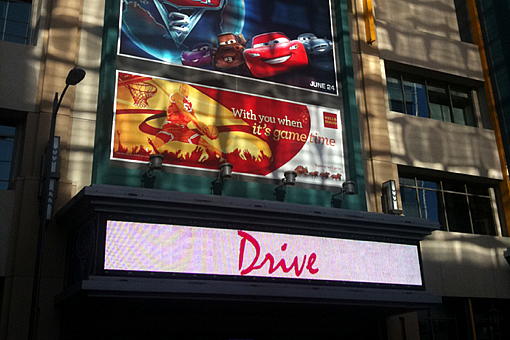By Ryan Mason · June 18, 2011

Not only was the Friday night screening of Drive at the Los Angeles Film Festival the North American world premiere of the critically acclaimed film that reportedly received a 10-minute ovation at Cannes, it also marks the Hollywood debut for Danish filmmaker Nicholas Winding Refn, a director who doesn’t shy away from showing graphic violence in his pictures – and this Ryan Gosling-vehicle is no different.
The director and stars (minus Carey Mulligan) all showed up before the evening screening, where Winding Refn said some requisite thank yous as his introduction to the film in front of a packed audience. (In fact, there were two full theaters needed to handle the number of people who came to see it.) He also alluded to Gosling being one of the main reasons that he’d even done the film in the first place, and offered some surely-more-serious-than-the-humor-would-have-you-believe advice to other European filmmakers looking to break into Tinseltown: just smile and nod. Gosling received the most audience applause, followed by an equally riotous response when Albert Brooks came out on stage. I won’t give anything away about the film other than you’ve never seen Brooks like this before.
If you know anything about the movie, you’ve probably seen the 2-minute clip out there on the Internet that has Gosling playing a getaway driver for some hoodlums, navigating Downtown LA streets – the same ones just outside the doors of the very theater in which we were all watching – as they make their escape from the burglary. It also happens to be from the opening scene, and while the film goes off into a different direction than the initial moments might suggest, it’s all an overwhelming success. Winding Refn creates one of those rare, noir-action thrillers that builds suspense both through character development and incredibly staged chase scenes. The film is called Drive, after all.
In directing Gosling’s on-screen main character, whose quiet demeanor masks a calculating ability to handle just about any situation, Winding Refn likely didn’t need to look too far away from the mirror, as his uncanny ability to hit all the right notes in setting up the pitch perfect tone and pacing could only come from someone equally as professional and in control of his craft. It’s true that Winding Refn is known for the extreme violence in his films like Bronson and Valhalla Rising, and he definitely keeps this trend alive with Drive; however, his masterful building of tension is what makes it all work, keeping it from becoming gratuitous or cartoonish. And while the subject matter gets presented in a more straightforward manner than some of his other films (read: more Hollywood-friendly), Winding Refn’s unique cinematic signature permeates the entire film – most notably his use of sound design, arguably one the best skills in his remarkable storytelling arsenal.
Gosling solidifies himself as a more-than-capable leading man, but he was already on that path before this. The real winner here his Winding Refn, who, if there’s any justice, will be making his brand of hybrid Eurowood movies for years to come.